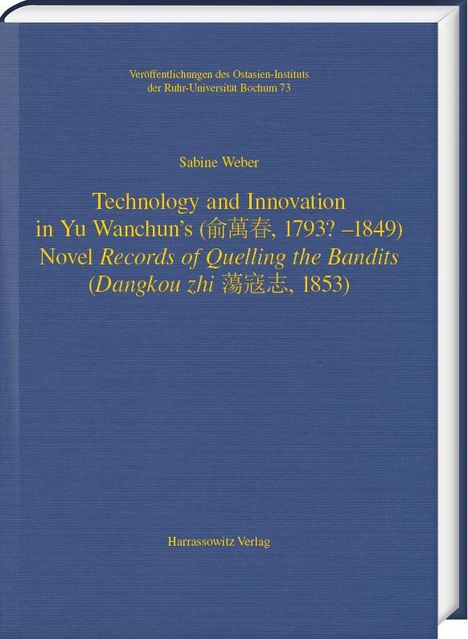Sabine Weber: Technology and Innovation in Yu Wanchun's (¿¿¿, 1793? - 1849) Novel Records of Quelling the..., Gebunden
Technology and Innovation in Yu Wanchun's (¿¿¿, 1793? - 1849) Novel Records of Quelling the Bandits (Dangkou zhi ¿¿¿, 1853)

- Verlag:
- Harrassowitz Verlag, 12/2024
- Einband:
- Gebunden
- Sprache:
- Englisch
- ISBN-13:
- 9783447122627
- Artikelnummer:
- 12049424
- Sonstiges:
- 21 illustrations, 5 tables
- Gewicht:
- 868 g
- Maße:
- 243 x 175 mm
- Stärke:
- 24 mm
- Erscheinungstermin:
- 18.12.2024
- Serie:
- Veröffentlichungen des Ostasien-Instituts der Ruhr-Universität, Bochum - Band 73
- Hinweis
-
Achtung: Artikel ist nicht in deutscher Sprache!
Klappentext
As the first book-length study devoted exclusively to developments of Chinese science fiction before 1902, Sabine Weber explores the question of how to relate the early literary elements to the later, self-conscious modern forms and unite them in a comprehensive history of Chinese science fiction. By taking Yu Wanchun's (¿¿¿, 1793?-1849) sequel to Jin Shengtan's (¿¿¿, 1608-1661) rendition of The Water Margin (Shuihu zhuan ¿¿¿, 1644) Records of Quelling the Bandits (Dangkou zhi ¿¿¿, 1853) as a primary source she also analyzes the specific role of the literary 19th century in the history of the emergence of science fiction in China. The novel of the Late Qing period (ca. 1793-1896) represents a special case in the historical process, as it developed structural and motif-oriented patterns that brought it close to structurally "modern" science fiction in terms of the epistemological basis of Chinese science and technology history. Written in the style of the classic Water Margin , but by a militarist thinker from the background of jingshi zhiyong ¿¿¿¿ (literally meaning "managing the world by extending practical utility") in 19th-century Jiangnan, Records of Quelling the Bandits serves as a vivid example of how contemporary Chinese discourses of innovation and practical knowledge were imbedded in established literary frameworks. It was this combination of rationality and pragmatism with classical poetics and literary motifs that pushed images of traditional fiction, hearsay and legend towards speculative technology and theoretical thought experiments, thus providing the basis for the translation-inspired early modern science fiction novel from the end of the century.

